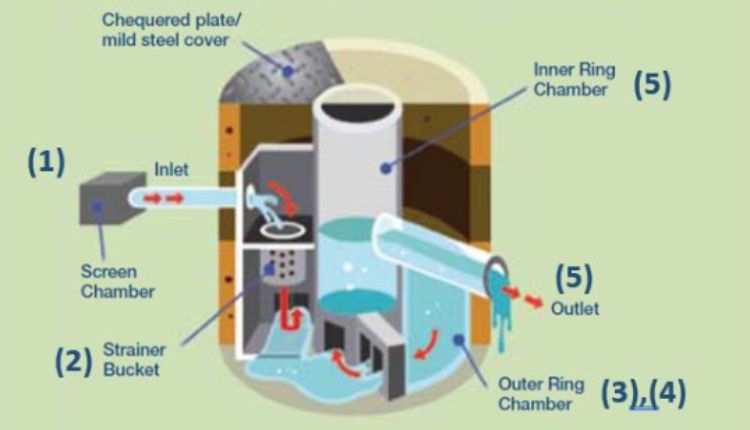When we think about protecting the environment, we tend to picture renewable energy, recycling bins, and electric cars. But what if one of the unsung heroes of environmental protection is hiding beneath our kitchen sinks and restaurant floors? Grease traps, while often overlooked, play a crucial role in keeping our waterways clean, our sewer systems working, and our environment safe from long-term harm.
The Hidden Culprit: FOG (Fats, Oils, and Grease)
Every time you cook with oil, grill meat, or rinse off a greasy plate, fats, oils, and grease (collectively known as FOG) enter the wastewater system. In small amounts, they seem harmless. But at scale, FOG is a serious problem. When these substances cool, they solidify. Over time, they can clog sewer lines, damage wastewater treatment equipment, and cause sewage backups into homes, businesses, and natural waterways.
This is more than just a plumbing issue. Blockages caused by FOG can lead to untreated wastewater being discharged into rivers and oceans. The result? Contaminated water sources, dying marine life, and expensive cleanup efforts that ultimately affect taxpayers.
What Exactly Does a Grease Trap Do?
A grease trap is a plumbing device designed to stop your daily FOG before it enters the sewage system. Installed in commercial kitchens, cafes, and even some residential settings, these traps slow down the flow of warm, greasy water, allowing it to cool. As it cools, the FOG separates and rises to the top, while solids sink to the bottom. Only the cleaner water flows through to the main sewer line.
It may sound like a simple system, but its impact is anything but small.
Grease Traps as First Responders for the Environment
Think of grease traps as first responders. They intercept pollution before it becomes a bigger, harder-to-solve issue. Every litre of grease captured is a litre that won’t congeal in pipes or pollute rivers. That’s why cities around the world enforce grease trap regulations for food service establishments. It’s not just about keeping drains flowing—it’s about keeping ecosystems healthy.
Consider a city like Perth, where a booming food scene means thousands of meals cooked daily. Without working grease traps in restaurants, fast food joints, and cafeterias, FOG would quickly overwhelm the sewer system. That’s why services that install and maintain a grease trap Perth businesses can rely on are not just offering convenience—they’re helping protect the local environment.
Why This Matters to Everyone—Not Just Business Owners
You might think this is only a concern for commercial kitchens, but it affects all of us. Clogged sewer systems can lead to rate increases from water utilities. Environmental damage from untreated wastewater affects beaches, fishing zones, and drinking water supplies. In some cases, property owners are liable for damage caused by illegal FOG discharge.
Homeowners who cook with oil regularly should also be aware. Even in small homes, FOG can accumulate and cause drain issues. Using strainers in sinks, disposing of oil in the trash instead of down the drain, and installing small-scale grease traps in home kitchens are simple ways individuals can contribute.
The Bigger Picture: Climate and Sustainability
Environmental protection isn’t only about reducing carbon emissions. It’s also about protecting the natural systems we rely on daily. Clean water, functioning sewer infrastructure, and healthy marine life are all part of the equation. Grease traps support sustainability by reducing the need for chemical treatments, preventing energy-intensive emergency repairs, and lowering the risk of environmental contamination.
Proper FOG management also supports the circular economy. Some waste management companies now convert captured grease into biodiesel, a renewable energy source. So, what starts as a kitchen byproduct can end up powering buses or heating buildings.
Maintaining Grease Traps: A Necessary Responsibility
Installing a grease trap isn’t a set-and-forget solution. Without regular cleaning and maintenance, traps become ineffective, or worse, hazardous. Overfilled traps can emit foul odors, attract pests, and still allow grease to slip through into the sewer system.
Businesses should schedule regular pump-outs and ensure their staff understands how to minimize FOG discharge. Some cities require proof of maintenance as part of environmental compliance. It’s a small investment that pays off in reduced risk and a cleaner community.
Future-Proofing Urban Infrastructure
As cities grow and infrastructure ages, preventing avoidable strain on plumbing systems becomes even more critical. Grease traps help by reducing the frequency and severity of blockages, protecting not only the environment but also public health and city budgets.
Imagine the domino effect: fewer backups mean fewer emergency cleanups, fewer pollutants in rivers, and less demand on water treatment facilities. It’s a practical, cost-effective way to build environmental resilience.
Final Thoughts
Grease traps may not grab headlines or spark passionate debates, but their role in environmental protection is undeniable. They quietly serve as a frontline defense against pollution, keeping our waterways cleaner, our infrastructure stronger, and our cities healthier.
So next time you see a kitchen staffer scraping plates into a bin or a maintenance truck servicing a restaurant grease trap, remember: small actions like these help safeguard the environment for everyone. Even the least glamorous parts of urban life can play a heroic role when it comes to protecting the planet.






